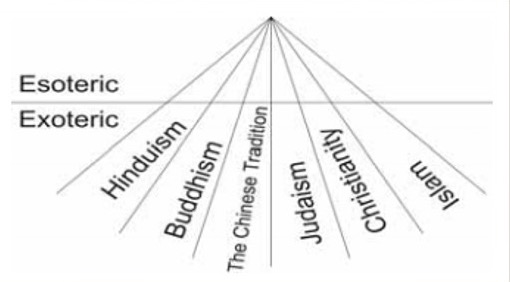The Perennial Philosophy is a concept that refers to the underlying, universal spiritual truths that are shared by all the major religions and mystical traditions throughout human history. This concept posits that, despite the diversity of religious and cultural practices, there is a core set of spiritual principles that are consistent across all traditions. This article will explore the origins of the Perennial Philosophy, its proponents, and their contributions to the study of spirituality.
Origins of the Perennial Philosophy
The origins of the Perennial Philosophy can be traced back to the ancient world, with the works of philosophers like Plato and Aristotle. Plato believed in the existence of eternal Forms or Ideas that exist beyond the physical world, and that human knowledge of these Forms is innate. Aristotle also believed in the existence of a transcendent, divine reality that underlies the physical world. These ideas influenced later philosophers, such as Plotinus, who developed a system of Neoplatonism that sought to reconcile Platonic and Aristotelian philosophy with religious mysticism.
The Perennial Philosophy gained popularity in the early modern period, particularly through the works of the German mystic Jacob Boehme and the Dutch philosopher Baruch Spinoza. Boehme believed that there was a divine essence within all things, and that the ultimate goal of human existence was to realize this essence within oneself. Spinoza, on the other hand, argued that God is the ultimate substance of the universe, and that all things are simply manifestations of God’s essence.
Proponents of the Perennial Philosophy
One of the most influential proponents of the Perennial Philosophy was the British author and philosopher Aldous Huxley. In his book “The Perennial Philosophy” (1945), Huxley argued that all the major religions share a common mystical experience of transcendence, and that this experience is the basis of the Perennial Philosophy. He believed that the Perennial Philosophy could provide a framework for a more integrated and harmonious global culture.
Another prominent proponent of the Perennial Philosophy was the French philosopher and mystic Pierre Teilhard de Chardin. Teilhard believed that the universe was evolving towards a state of spiritual unity, and that this process was guided by a divine energy he called the Omega Point. He saw the Perennial Philosophy as a way of reconciling science and religion, and of providing a basis for a new spiritual vision of the world.
The ideas of the Perennial Philosophy have also been influential in the field of comparative religion. Scholars like Huston Smith have argued that there is a common core of spiritual truth that can be found in all the major religious traditions, and that the study of this common ground can promote greater interfaith understanding and cooperation.
Core Principles of the Perennial Philosophy
The core principles of the Perennial Philosophy can be summarized as follows:
- There is a transcendent, spiritual reality that underlies the physical world.
- The ultimate goal of human existence is to realize this spiritual reality within oneself.
- This realization can be achieved through mystical experience or direct apprehension of the divine.
- All the major religions and mystical traditions share a common core of spiritual truth, despite their differences in cultural practices and beliefs.
- The study of this common ground can promote greater interfaith understanding and cooperation.
Conclusion
The Perennial Philosophy is a concept that has been influential in the fields of philosophy, religion, and spirituality. It posits that there is a core set of spiritual principles that are consistent across all the major religious and mystical traditions. The Perennial Philosophy has been championed by thinkers like Aldous Huxley, Pierre Teilhard de Chardin, and Huston Smith, and has provided a framework for greater interfaith understanding and cooperation. While the Perennial Philosophy is not without its critics, it continues to be a source of inspiration and contemplation for those seeking a deeper understanding of the spiritual dimension of human existence.
Critics of the Perennial Philosophy have argued that it oversimplifies the differences between religions and mystical traditions, and that it tends to privilege certain Western perspectives over non-Western ones. They also point out that the concept of a universal spiritual truth may not be relevant or meaningful to all people, particularly those who do not identify with a religious or mystical tradition.
Despite these criticisms, the Perennial Philosophy remains a powerful idea that has inspired many people to explore the common ground between different spiritual traditions. It has contributed to a greater appreciation of the diversity of religious and cultural practices, while also highlighting the underlying unity that connects all human beings in their search for spiritual truth.
Footnotes:
- Huxley, Aldous. The Perennial Philosophy. Harper & Brothers, 1945.
- Teilhard de Chardin, Pierre. The Phenomenon of Man. Harper & Row, 1959.
- Smith, Huston. The World’s Religions: Our Great Wisdom Traditions. HarperOne, 1991.
- Katz, Steven T. Mysticism and Philosophical Analysis. Oxford University Press, 1978.
- Stace, W.T. Mysticism and Philosophy. Macmillan, 1960.

